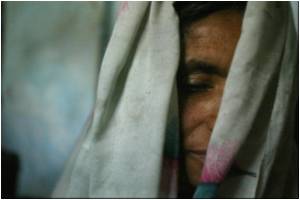Mansoora Bano was dumbfounding to see her decorated house towards her elder sister’s wedding which, until two days before wreathed in poverty.

The stranger hailed from Sholra Village of Jammu and Kashmir's Kupwara district. He not only offered to bear the entire expenses of the marriage but also offered a sum of Rs 20,000. Her father had agreed promptly, with a sigh of relief.
Four years later, the stranger was back before the impoverished family, this time offering to marry Mansoora herself.
In the Kashmir Valley, there are several cases where poor, physically disabled and unemployed men, facing rejection within their own community for marriage, purchase women from different parts of India - particularly from Bihar and West Bengal, through established brokers. This dreadful business is booming in the state of J and K, despite the existence of the Immoral Traffic (Prevention) Act, 1956.
In October 2011, a case of one Rehana (name changed), who had been trafficked from her home in Bihar to Kashmir, was reported in the Court of Chadoora in Budgam District in central Kashmir.
Rehana was a divorcee who lived in Bihar with her young son. Salman Rashid (name changed) had come to their village along with a broker who ran a thriving business of 'arranging' women for Kashmiri men. He baited Rehana's family, offering to marry her to Salman (who was 10 years older to her), promising that Salman not only will marry her but would adopt her child as well. What argument could Rehana give herself for not marrying Salman?
Advertisement
Furious Salman started beating her and deprived her off almost everything including food and clothing. The matter reached the court and after several rounds of allegations, the couple agreed to be separated. It is believed that Rehana was bought by some other local broker Javed (name changed) against a sum of Rs 25,000 and it was Javed who convinced Salman to divorce her by bribing him with Rs. 800. Rashid was only too happy to earn some fast cash.
Advertisement
The victims fight not a person but a society. Most of these women are grappling with adjustment issues and have to deal with differences in language, climate, food, living habits, culture and societal norms. Although the decision of buying a woman from a different state is taken in accord with the entire family, the in-laws often do not accept her as a part of the family and discriminate her for being a Non-Kashmiri.
Being poor is not the only hurdle. Many cases go unreported, as these illiterate women are unaware of their rights. This inhibits them from taking a step forward and getting the matter registered.
"During my visit to Iskandarpora of Beerwah, in District Budgam, I was surprised to spot several women from Bengal who were married to Kashmiri men. These women complained of domestic and sexual violence," said Hanjoora.
When asked what made them willingly fall into the trap, their answer was "Money". One can find many women living with these Kashmiri men without even being married. The law becomes helpless when these couples say that they have performed Nikah - they use Nikah as their shield.
In order to stop further exploitation, some extra efforts are required to be invested by the government and non-government organisations. Women Right Commission, NGOs and Police need to come forward. Besides keeping an eye on these couples, they should monitor their activities. Members of Panchayat can become a powerful resource to check women trafficking as most of the cases take place in rural areas - Beerwah, Kupwara, Chaoora are worst affected.
Hanjoora suggests that the best method of curbing this social evil is to combine such ideas with prosecution and protection. Prosecution includes several tasks like the identification of the traffickers, bringing them to book; and confiscating their illegal assets. Protection of the trafficked victim includes all steps towards the redressal of their grievances thus helping the victim survive, rehabilitate and live a life of dignity. Thus prosecution and protection contribute to prevention.
Needless to say, political will is an essential requirement to combat trafficking. Legal awareness plays a crucial role in any social action programme. In its absence any real social activism cannot be promoted as it empowers people by making them aware of their rights, and motivates them to develop zero tolerance towards abuse and exploitation.
The history of the state of J and K is so complex that no issues other than those related to the political situation register their presence in the media and consciousness of the people, both within Kashmir and outside. Issues like trafficking; domestic violence and sexual exploitation are low visibility, low priority matters.
We respect unity in diversity but what is the point when we force the diversity to unite - if a Kashmiri man would have married a woman from Bihar or Bengal in the backdrop of love, it would have been an inspiring example to the world.
The Charkha Development Communication network feels that today it is simply a national shame. (with inputs from Basheer Ahmed Peer) y Zeenat Zeeshan Fazil.
Source-ANI









